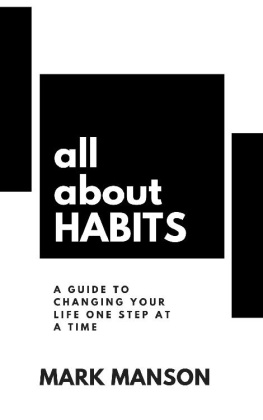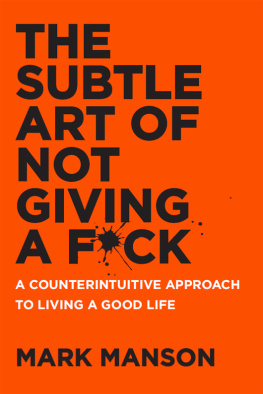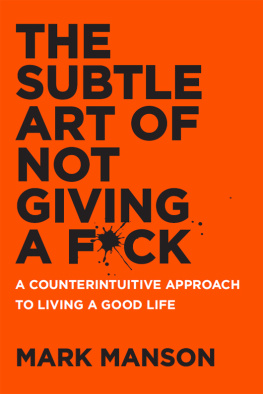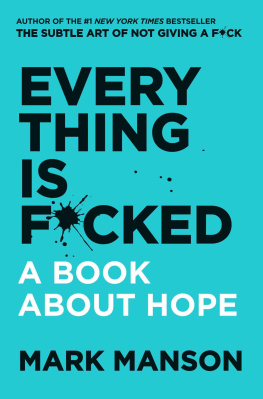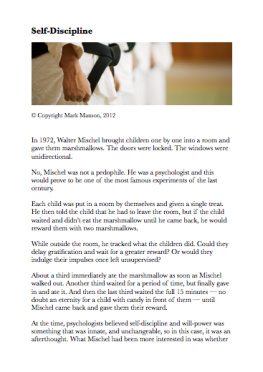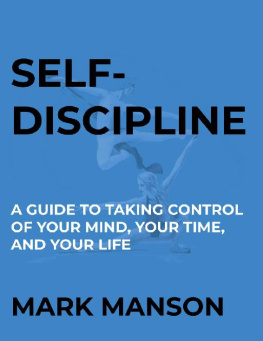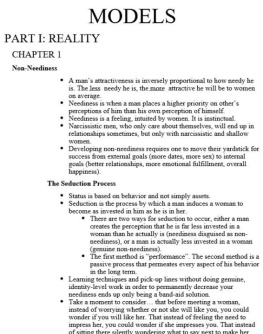Mark Manson - All About Habits: A Guide to Changing Your Life One Step at a Time
Here you can read online Mark Manson - All About Habits: A Guide to Changing Your Life One Step at a Time full text of the book (entire story) in english for free. Download pdf and epub, get meaning, cover and reviews about this ebook. year: 2018, genre: Home and family. Description of the work, (preface) as well as reviews are available. Best literature library LitArk.com created for fans of good reading and offers a wide selection of genres:
Romance novel
Science fiction
Adventure
Detective
Science
History
Home and family
Prose
Art
Politics
Computer
Non-fiction
Religion
Business
Children
Humor
Choose a favorite category and find really read worthwhile books. Enjoy immersion in the world of imagination, feel the emotions of the characters or learn something new for yourself, make an fascinating discovery.
- Book:All About Habits: A Guide to Changing Your Life One Step at a Time
- Author:
- Genre:
- Year:2018
- Rating:4 / 5
- Favourites:Add to favourites
- Your mark:
- 80
- 1
- 2
- 3
- 4
- 5
All About Habits: A Guide to Changing Your Life One Step at a Time: summary, description and annotation
We offer to read an annotation, description, summary or preface (depends on what the author of the book "All About Habits: A Guide to Changing Your Life One Step at a Time" wrote himself). If you haven't found the necessary information about the book — write in the comments, we will try to find it.
All About Habits: A Guide to Changing Your Life One Step at a Time — read online for free the complete book (whole text) full work
Below is the text of the book, divided by pages. System saving the place of the last page read, allows you to conveniently read the book "All About Habits: A Guide to Changing Your Life One Step at a Time" online for free, without having to search again every time where you left off. Put a bookmark, and you can go to the page where you finished reading at any time.
Font size:
Interval:
Bookmark:
MARKMANSON.NET
2018
Mark Manson
I n 1972, developmental psychologist Walter Mischel conducted almost by accidentone of the most famous experiments of the century.
He brought children into a room, one by one, and gave them a single treat. He then told the child that he had to leave the room, but if the child waited and didnt eat the marshmallow until he came back, he would reward them with two marshmallows.
While outside the room, he tracked what the children did. Could they delay gratification and wait for a greater reward? Or would they indulge their impulses once left unsupervised?
About a third of the children immediately ate the marshmallow as soon as Mischel walked out. Another third waited for a period of time, but finally gave in and ate it. And then the last third waited the full 15 minutes no doubt an eternity for a child with candy in front of them.
At the time, psychologists believed willpower was something that was innate and unchangeable, so in this case, it was an afterthought. What Mischel had been more interested in was whether a childs age correlated with their ability to delay gratification. It was an experiment in developmental psychology, not personality.
And sure enough, it did correlate: older children were, on average, able to wait longer before giving into temptation. This got published. Mischel went on with his life and the children went on with theirs. The marshmallow experiment was a success, but largely forgotten.
But the Marshmallow Experiment wasnt done yet. About 20 years later, Mischel would unexpectedly revisit it, and his findings would shake up the psychological world.
It just so happened that one of the subjects of Mischels original experiment was his daughter (then five years old) and her schoolmates, including many of her friends. As the years dragged on and his daughter and her friends grew up, it became harder and harder for Mischel to ignore the fact that many of the kids who demonstrated no ability to delay gratification were getting in trouble at school and making poor grades while the ones who had showed a perfect display of delayed gratification were scoring high on their SATs and getting admitted to prestigious colleges. So 20 years later, he decided to track the children down and see where they had ended up as young adults.
The follow-up results were seismic and theyre the reason why the experiment continues to be so famous today.
A childs ability to delay gratification correlated with academic and professional success more than almost any other measure more than intelligence, more than standardized testing, more than household income, religion, personality tests, gender everything.
Psychologists conducted similar studies and found that people who were able to delay gratification longer were, on average, physically healthier, academically more successful, financially more stable, and overall, rated their subjective quality of life higher.
A definitive predictor of future success eluded psychologists for close to a century. The measurement of IQ had originally been invented for this purpose, but failed spectacularly, and other measurements proved just as faulty. But it appeared Mischel had stumbled upon a reliable predictor on accident.
For our generation, emphasis has always been put on self-esteem and not self-discipline. And it seems that were paying the price .
W illpower seems to be a dwindling virtue in our society today. More people are obese today than ever in world history. Attention spans are shrinking. Cases of narcissism, anxiety disorders, and depression are higher than ever before.
Self-discipline and the ability to create intentionally healthy habits is perhaps one of lifes most valuable skills.
Through lots of trial-and-error, and a lot reading really nerdy studies on the subject, heres everything I know about creating healthy habits that stick.
Enjoy.

In 1998, psychologist Roy Baumeister made a startling discovery. People who were forced to exert willpower (in this case, resisting eating cookies placed in front of them) did worse on puzzles and problem-solving tasks than people who indulged themselves. Thinking that perhaps it was a fluke of particularly hungry people, he and other psychologists ended up testing this over and over again across multiple scenario s and found the same thing: people who are forced to exert willpower and focus on one task, are worse at exerting willpower and focus on subsequent tasks.
What this means is that our willpower is finite and can be drained.
We each have a fuel tank of willpower that can be spent, and once we use it all up, we are far more prone to give up and indulge ourselves whims, impulses, and base desires.
This phenomenon is referred to in psychology as ego depletion.
This is why after a hard days work, all you want to do is sloth around on the couch and eat ice cream. Or why after a week of strict dieting its so easy to convince yourself that eating an entire pizza isnt such a big deal. Or why after studying all day for an exam you feel justified in going out and getting shitfaced on tequila and exposing yourself in public (not that this has ever happened, just saying).
This information depresses people. They figure, well, if I only have so much willpower, then I may as well conserve it for really important tasks, like practicing trick jumps in Halo 3 or not smacking my boss in the face tomorrow when he yells at me.
They figure theres no point in trying to get that six-pack or start that new business if they barely have enough willpower to make it through their current day-to-day drudgery.
But the good news is willpower is like a muscle. It can be exercised and practiced and built up. It can also be forgotten, weakened and atrophied. Just like going to the gym and building up strength and endurance, you can build up your discipline and willpower over a long period of time by setting and accomplishing a series of tasks on a consistent basis.
You can make your fuel tank bigger and bigger by draining it on a consistent basis.
And you can also slow the loss of willpower. Studies show that putting yourself into a positive and/or competitive mood has restorative effects on willpower,
This is why those catastrophic tasks as an adolescent (homework, flossing) become simple and an afterthought once youre older. You have a higher threshold for ego depletion; your willpower muscle is bigger and stronger. You also, ideally, give more of a crap about yourself and your well-being, so youre happy, excited even, to do these things.
Its also why some people are able to focus and work 12- or 16-hour days while others struggle to pour themselves coffee. Its not that theyre superhuman or genetically enhanced or neurotic. Theyve just built up their fuel tank to that level. Theyve practiced willpower to such an extent over such a long period of time that blowing through a 12-hour day of productivity becomes the new normal.
This is probably the biggest argument for studying consistently in university. For many of us, were able to loaf through college by staying up all night a couple days before the exam or term paper while screwing around for weeks on end. Thats how I was, and in some ways I regret it.
But at some point in your life, you will likely run into a situation where you wish you were capable of working one of these marathon sessions without breaking a sweat; or youll wish you were able to work consecutive series of marathon sessions when necessary starting your own business, working for a major promotion, sales pitch to investors, etc.
Next pageFont size:
Interval:
Bookmark:
Similar books «All About Habits: A Guide to Changing Your Life One Step at a Time»
Look at similar books to All About Habits: A Guide to Changing Your Life One Step at a Time. We have selected literature similar in name and meaning in the hope of providing readers with more options to find new, interesting, not yet read works.
Discussion, reviews of the book All About Habits: A Guide to Changing Your Life One Step at a Time and just readers' own opinions. Leave your comments, write what you think about the work, its meaning or the main characters. Specify what exactly you liked and what you didn't like, and why you think so.

